Clarification: Candidates Nelson Godoy and Roman Shevchuk have completed Alaska Public Offices Commission registration for their respective races but are not yet official candidates with the Alaska Division of Elections. This article has been updated to better clarify the distinction.
Campaigns for Alaska’s 2022 elections are ramping up, and campaign disclosure forms show a lot of cash on hand for some statewide candidates.
The races will be the first under the voter-approved open-primary and ranked choice voting system. The primary election is scheduled for Aug. 16, 2022, according to the state Division of Elections. The general election is set for Nov. 8, 2022.
Sen. Lisa Murkowski, R-Alaska, far and away has the most money of any of Alaska’s candidates, campaign disclosures show. According to the Federal Election Commission, Murkowski’s campaign has $3.2 million in cash on hand as of Sept. 30. The next closest candidate is Murkowski’s Republican challenger Kelly Tshibaka, who had more than $294,000 by the same date.
The Associated Press reported Wednesday former President Donald Trump will host a fundraiser in February for Tshibaka at his Mar-a-Lago club in Florida.
Libertarian Senate candidate Sean Michael Thorne reported $674 as of Sept. 30.
Federal filings show three other candidates for one Alaska’s two senate seats; Samuel Little, Republican; Karl Speights, unaffiliated and Joe Stephens, Alaska Independence Party, all of whom have reported no cash on hand.
Filings with the Alaska Division of Elections show several more candidates for Alaska’s senate seat but none of them are registered Democrats. Candidates registered with DOE for the U.S. Senate race are Huhnkie Lee, undeclared; Dustin Darden, Alaska Independence Party; Dave Darden, undeclared; Paul Kendall, Republican and Sidney ‘Sid’ Hill, unaffiliated.
So far, a Democratic candidate has not filed. Alaska’s 2020 Senate race was between Republican Dan Sullivan and Democratic-endorsed independent Dr. Al Gross. Sullivan won reelection.
The race for Alaska’s lone seat in the U.S. House of Representatives is filling up, but so far only with Republican candidates. The seat is currently held by Rep. Don Young, R-Alaska, who has four Republican challengers vying for the position.
[Dunleavy criticizes Biden policies during multistate conference]
According to the FEC, as of Sept. 30, Young has $480,000 in cash on hand while candidate Gregg Brelsford reported nearly $16,000 and Randy Purham reported $283. The remaining two Republican candidates — Nick Begich III and Shannon Scott Evans — report no money, but the FEC notes filing deadlines have not passed and the agency is still processing candidate data.
According to DOE, Libertarian Chris Bye has registered to run for Alaska’s House seat.
A Democratic candidate also has yet to enter the House race. In 2020, Young defeated second-time challenger Alyse Galvin, who like gross was a Democrat-endorsed independent.
There are several candidates for governor, but three of them have pre-existing campaign accounts. Candidates are allowed to keep money raised during one election cycle for future campaigns, and gubernatorial candidates Gov. Mike Dunleavy, Bill Walker and Les Gara have all served in public office.
Gov. Mike Dunleavy, a Republican, has a future campaign account showing $49,000, according to the Alaska Public Offices Commission.
Walker, an independent, has the same kind of account with $47,000 and Les Gara, a former member of the Alaska House of Representatives has a similar account with $6,000, APOC disclosures show. However, the last reported date for those candidates’ future campaign accounts is February 2021.
William Toien is running for governor as a Libertarian, according to DOE. Toien has previously run for governor, but APOC shows only filings from 2018.
Unaffiliated candidate Roman Shevchuk completed an APOC candidate registration form on Nov. 1, 2021, but is not yet registered with DOE, according to DOE spokesperson Tiffany Montemayor.
• Contact reporter Peter Segall at psegall@juneauempire.com. Follow him on Twitter at @SegallJnuEmpire.

